In This Episode << SLIDE LEFT TO SEE ADDITIONAL SEGMENTS
Ethical Eating
JUDY VALENTE: Mary Jo McMillin is a cookbook author from the Chicago suburbs. When she shops, she looks for fruits and vegetables that are in season, preferably locally grown. She doesn’t buy processed foods or fast food and makes sure she knows where the meat she’s buying comes from. It’s not just about green eating, or even healthful eating, but eating ethically.
MARY JO MCMILLIN: I’ve been using this brand of chicken for a long time and I’ve researched them and I know that they come from not very far away, and they’re produced on small farms. It’s done with high standards. They’re fed a vegetarian diet. They’re raised on these Amish farms. They’re sort of religious chickens, you know.
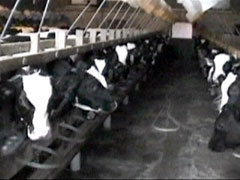 VALENTE: But there’s nothing funny about the way some large factory farms operate. Advocates of ethical eating protest the way animals are often kept in crowded, unsanitary conditions and injected with growth hormones and antibiotics. Norman Wirzba is professor of theology, ecology and rural life at Duke University.
VALENTE: But there’s nothing funny about the way some large factory farms operate. Advocates of ethical eating protest the way animals are often kept in crowded, unsanitary conditions and injected with growth hormones and antibiotics. Norman Wirzba is professor of theology, ecology and rural life at Duke University.
NORMAN WIRZBA: Cattle are meant to eat grass, to live in pasture. Chickens are, are meant to roam and be outside, and when you think about how industrial eating practices, right, stifle that inner drive, this natural drive that these animals have, it’s a violation of their ability to be what they are.
VALENTE: Another frequent criticism of the food industry is the widespread use of preservatives and artificial flavoring to prolong shelf life.
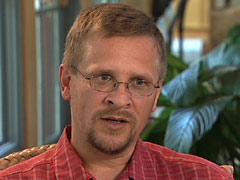 WIRZBA: That’s not to say we don’t do any processing, right, or any refrigeration or any preserving, no, we have to do some of that, but we don’t need to do it to the degree that we do, because as we do more of it, what we’re discovering is that we are paying for it with our own illness.
WIRZBA: That’s not to say we don’t do any processing, right, or any refrigeration or any preserving, no, we have to do some of that, but we don’t need to do it to the degree that we do, because as we do more of it, what we’re discovering is that we are paying for it with our own illness.
TARA SMITH: We have the safest, least expensive, most abundant food supply in the world, and that’s no accident.
VALENTE: Tara Smith of the American Farm Bureau Federation:
SMITH: You can find nutritious food year round in the grocery store. And if you look, and you’re willing to buy certain products, you can find relatively inexpensive healthy food products year round.
VALENTE: Ethical eating means looking at food as more than a commodity and eating as more than a biological function. Eating, it is said, connects us to the mysterious and miraculous character of life.
STUDENT: Oh, my gosh. This one is a little larger than this one, as you can see…
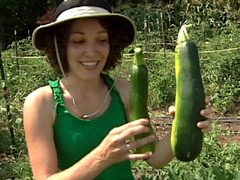 VALENTE: Many Americans are getting back to the garden. These students in Cedar Grove, North Carolina brave intense summer heat as they learn to grow fruits and vegetables in a community garden.
VALENTE: Many Americans are getting back to the garden. These students in Cedar Grove, North Carolina brave intense summer heat as they learn to grow fruits and vegetables in a community garden.
STUDENT: You can just pull it right out, and just rinse them off and you can eat them.
KATE FORER: Right here we have sweet potatoes, that are doing fabulously, as you can tell.
VALENTE: Kate Forer, who manages the garden, is also an ordained minister.
FORER: Having the experience of planting a seed and having the faith that it’ll grow into a plant that will eventually sustain me is a spiritual experience. And ultimately I really, really feel like food is a sacred gift from God, and that’s something that we tend to forget about in our culture.
VALENTE: Small faith communities like this one are sprouting up all across the country to advance the cause of ethical eating, teaching more than just good gardening practices.
FORER: I also feel like we’re teaching people how to cultivate peace in their communities just by working together. Just by dong a task together that’s not always easy or fun. I mean, sometimes gardening is hot and frustrating and stressful. But being able to work through those things together can be really powerful.
VALENTE: For others, personal gardening is also an opportunity for spiritual growth. Everyday, Mary Jo McMillin walks about a half mile to a public park where for a yearly fee of $32, she can cultivate her own plot of land and her prayer life.
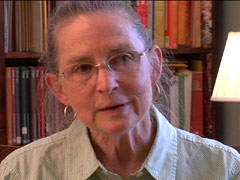 MCMILLIN: Going to the garden is part of a spiritual practice for me. I use that time to think about what I’m thankful for, and to try to remember people in my past that I’m thankful for, and my family that surrounds me now. It’s just my daily meditation. I feel I’m in a place where things are really alive and growing. We’re all so busy, adding extra hours to our fitness routine, adding an extra hour to our e-mail, Twitter, and Facebook, whatever. But maybe we need really to sometimes add that extra hour to what we’re ingesting, what we’re feeding ourselves.
MCMILLIN: Going to the garden is part of a spiritual practice for me. I use that time to think about what I’m thankful for, and to try to remember people in my past that I’m thankful for, and my family that surrounds me now. It’s just my daily meditation. I feel I’m in a place where things are really alive and growing. We’re all so busy, adding extra hours to our fitness routine, adding an extra hour to our e-mail, Twitter, and Facebook, whatever. But maybe we need really to sometimes add that extra hour to what we’re ingesting, what we’re feeding ourselves.
SMITH: I don’t know about you but I don’t have time to make every loaf of bread I eat.
VALENTE: What about the person who says, “I’m busy. I don’t have time to worry about where my food comes from”?
WIRZBA: I think we need to make food a priority because food touches so much. It touches personal health, it touches education, the social development of people, right, as well as touching economic issues and ecological issues. So food needs to be a priority.
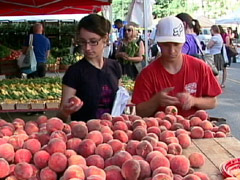 VALENTE: One downside to eating ethically, at least these days, is that it’s probably going to cost more, as shoppers often discover when they buy organic food, or from local farmers’ markets.
VALENTE: One downside to eating ethically, at least these days, is that it’s probably going to cost more, as shoppers often discover when they buy organic food, or from local farmers’ markets.
SMITH: Right now, during these economic times, we have one out of every eight Americans is currently on food stamps. Budgets, when it comes to purchasing food items, are very important to most American households.
WIRZBA: I know that there is a lot of concern about the fact that if you want to buy organic food it’s more expensive, or you want to buy locally produced food it’s more expensive. But we have to ask the question, well, what do we really value? Do we value healthy land, clean water, vibrant farm communities?
SMITH: I certainly feel my nutrition is my personal responsibility and I think that folks should take some personal responsibility for being sure that their diet is the way that it should be. There is no lack of option for food products here in the United States. If you don’t choose to eat those healthy food products, though, no one can force-feed them to people.
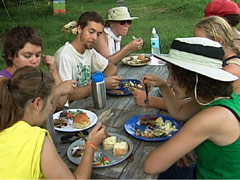 VALENTE: The importance of food, or sharing a meal, is deeply rooted in religious tradition. McMillin, for instance, bakes the fresh bread her congregation uses at its communion services.
VALENTE: The importance of food, or sharing a meal, is deeply rooted in religious tradition. McMillin, for instance, bakes the fresh bread her congregation uses at its communion services.
MCMILLIN: It takes us back to the point that this really isn’t just a big symbolical ritual, it’s also a meal that feeds both the body and the spirit. So many families have come up to me at church and said “our children just love to have real bread at communion.”
FORER: (speaking to students) It’s good to see everybody here.
VALENTE: In most of the world’s religions, eating traditionally involved a blessing, and an expression of thanks, a practice Forer and others say has become all but lost in our mass-production, fast- food culture.
FORER: All right, let’s pray. Gracious God we give you thanks…
Grace is a way of pausing and remembering the creator who has given us this. But for me grace is also a way to acknowledge the other people who have brought the food to us.
WIRZBA: Saying grace, besides being a sort of ritual act, I think is also a political act, because if you’re truly saying grace and you’re remembering this food that you’re about to eat, you should also be committing yourself to the well-being of the sources of that food.
MCMILLIN: I remember my mother sitting in front of a perfectly ripened peach, We had peach trees, the first ones that we had — and saying, “I’m going to eat this very slowly. Just think how long it took to grow.”
VALENTE: Advocates of ethical eating say if we pay more attention to where our food comes from, we will begin to see it not as something that just happens, but as a gift.
For Religion & Ethics NewsWeekly, this is Judy Valente in Cedar Grove, North Carolina.

